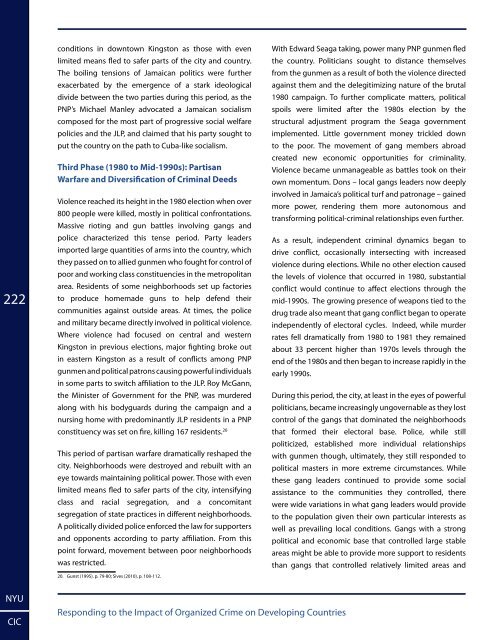Jamaica - Center on International Cooperation
Jamaica - Center on International Cooperation
Jamaica - Center on International Cooperation
You also want an ePaper? Increase the reach of your titles
YUMPU automatically turns print PDFs into web optimized ePapers that Google loves.
222<br />
c<strong>on</strong>diti<strong>on</strong>s in downtown Kingst<strong>on</strong> as those with even<br />
limited means fled to safer parts of the city and country.<br />
The boiling tensi<strong>on</strong>s of <str<strong>on</strong>g>Jamaica</str<strong>on</strong>g>n politics were further<br />
exacerbated by the emergence of a stark ideological<br />
divide between the two parties during this period, as the<br />
PNP’s Michael Manley advocated a <str<strong>on</strong>g>Jamaica</str<strong>on</strong>g>n socialism<br />
composed for the most part of progressive social welfare<br />
policies and the JLP, and claimed that his party sought to<br />
put the country <strong>on</strong> the path to Cuba-like socialism.<br />
Third Phase (1980 to Mid-1990s): Partisan<br />
Warfare and Diversificati<strong>on</strong> of Criminal Deeds<br />
Violence reached its height in the 1980 electi<strong>on</strong> when over<br />
800 people were killed, mostly in political c<strong>on</strong>fr<strong>on</strong>tati<strong>on</strong>s.<br />
Massive rioting and gun battles involving gangs and<br />
police characterized this tense period. Party leaders<br />
imported large quantities of arms into the country, which<br />
they passed <strong>on</strong> to allied gunmen who fought for c<strong>on</strong>trol of<br />
poor and working class c<strong>on</strong>stituencies in the metropolitan<br />
area. Residents of some neighborhoods set up factories<br />
to produce homemade guns to help defend their<br />
communities against outside areas. At times, the police<br />
and military became directly involved in political violence.<br />
Where violence had focused <strong>on</strong> central and western<br />
Kingst<strong>on</strong> in previous electi<strong>on</strong>s, major fighting broke out<br />
in eastern Kingst<strong>on</strong> as a result of c<strong>on</strong>flicts am<strong>on</strong>g PNP<br />
gunmen and political patr<strong>on</strong>s causing powerful individuals<br />
in some parts to switch affiliati<strong>on</strong> to the JLP. Roy McGann,<br />
the Minister of Government for the PNP, was murdered<br />
al<strong>on</strong>g with his bodyguards during the campaign and a<br />
nursing home with predominantly JLP residents in a PNP<br />
c<strong>on</strong>stituency was set <strong>on</strong> fire, killing 167 residents. 20<br />
This period of partisan warfare dramatically reshaped the<br />
city. Neighborhoods were destroyed and rebuilt with an<br />
eye towards maintaining political power. Those with even<br />
limited means fled to safer parts of the city, intensifying<br />
class and racial segregati<strong>on</strong>, and a c<strong>on</strong>comitant<br />
segregati<strong>on</strong> of state practices in different neighborhoods.<br />
A politically divided police enforced the law for supporters<br />
and opp<strong>on</strong>ents according to party affiliati<strong>on</strong>. From this<br />
point forward, movement between poor neighborhoods<br />
was restricted.<br />
20. Gunst (1995). p. 79-80; Sives (2010), p. 108-112.<br />
With Edward Seaga taking, power many PNP gunmen fled<br />
the country. Politicians sought to distance themselves<br />
from the gunmen as a result of both the violence directed<br />
against them and the delegitimizing nature of the brutal<br />
1980 campaign. To further complicate matters, political<br />
spoils were limited after the 1980s electi<strong>on</strong> by the<br />
structural adjustment program the Seaga government<br />
implemented. Little government m<strong>on</strong>ey trickled down<br />
to the poor. The movement of gang members abroad<br />
created new ec<strong>on</strong>omic opportunities for criminality.<br />
Violence became unmanageable as battles took <strong>on</strong> their<br />
own momentum. D<strong>on</strong>s – local gangs leaders now deeply<br />
involved in <str<strong>on</strong>g>Jamaica</str<strong>on</strong>g>’s political turf and patr<strong>on</strong>age – gained<br />
more power, rendering them more aut<strong>on</strong>omous and<br />
transforming political-criminal relati<strong>on</strong>ships even further.<br />
As a result, independent criminal dynamics began to<br />
drive c<strong>on</strong>flict, occasi<strong>on</strong>ally intersecting with increased<br />
violence during electi<strong>on</strong>s. While no other electi<strong>on</strong> caused<br />
the levels of violence that occurred in 1980, substantial<br />
c<strong>on</strong>flict would c<strong>on</strong>tinue to affect electi<strong>on</strong>s through the<br />
mid-1990s. The growing presence of weap<strong>on</strong>s tied to the<br />
drug trade also meant that gang c<strong>on</strong>flict began to operate<br />
independently of electoral cycles. Indeed, while murder<br />
rates fell dramatically from 1980 to 1981 they remained<br />
about 33 percent higher than 1970s levels through the<br />
end of the 1980s and then began to increase rapidly in the<br />
early 1990s.<br />
During this period, the city, at least in the eyes of powerful<br />
politicians, became increasingly ungovernable as they lost<br />
c<strong>on</strong>trol of the gangs that dominated the neighborhoods<br />
that formed their electoral base. Police, while still<br />
politicized, established more individual relati<strong>on</strong>ships<br />
with gunmen though, ultimately, they still resp<strong>on</strong>ded to<br />
political masters in more extreme circumstances. While<br />
these gang leaders c<strong>on</strong>tinued to provide some social<br />
assistance to the communities they c<strong>on</strong>trolled, there<br />
were wide variati<strong>on</strong>s in what gang leaders would provide<br />
to the populati<strong>on</strong> given their own particular interests as<br />
well as prevailing local c<strong>on</strong>diti<strong>on</strong>s. Gangs with a str<strong>on</strong>g<br />
political and ec<strong>on</strong>omic base that c<strong>on</strong>trolled large stable<br />
areas might be able to provide more support to residents<br />
than gangs that c<strong>on</strong>trolled relatively limited areas and<br />
NYU<br />
CIC<br />
Resp<strong>on</strong>ding to the Impact of Organized Crime <strong>on</strong> Developing Countries
















